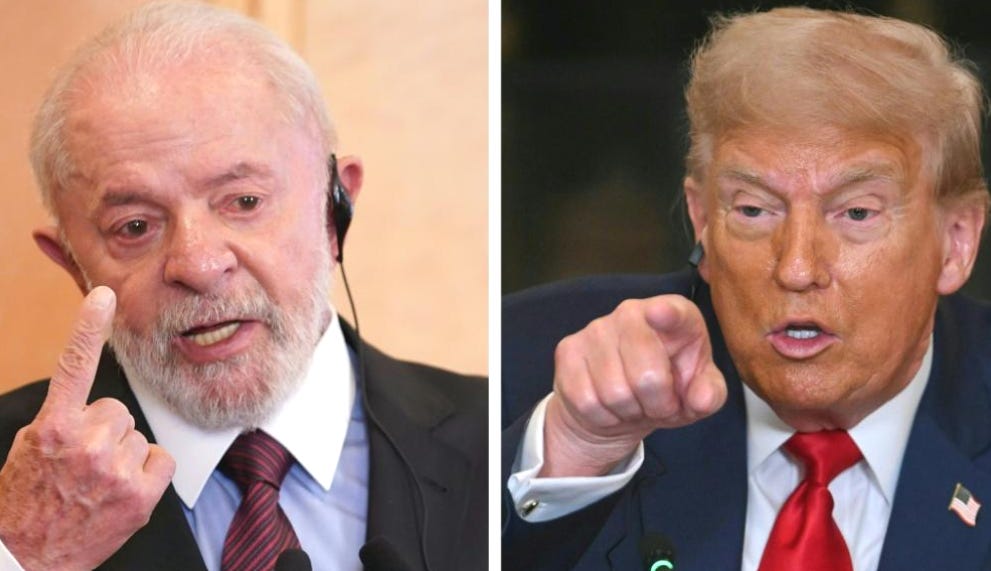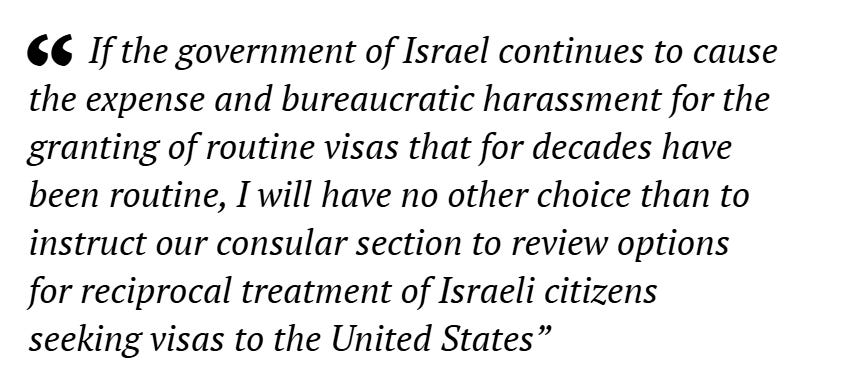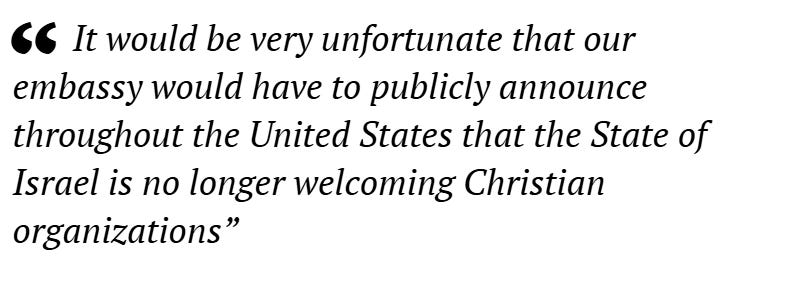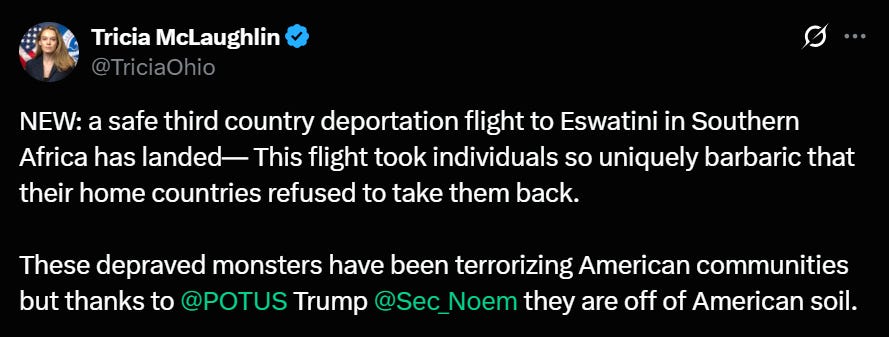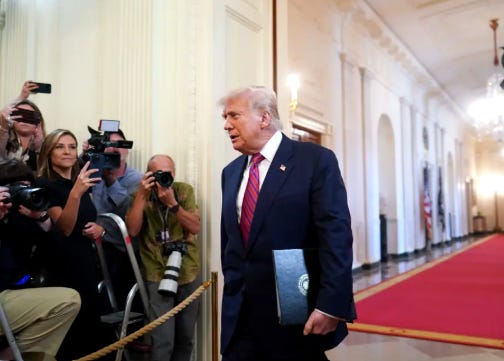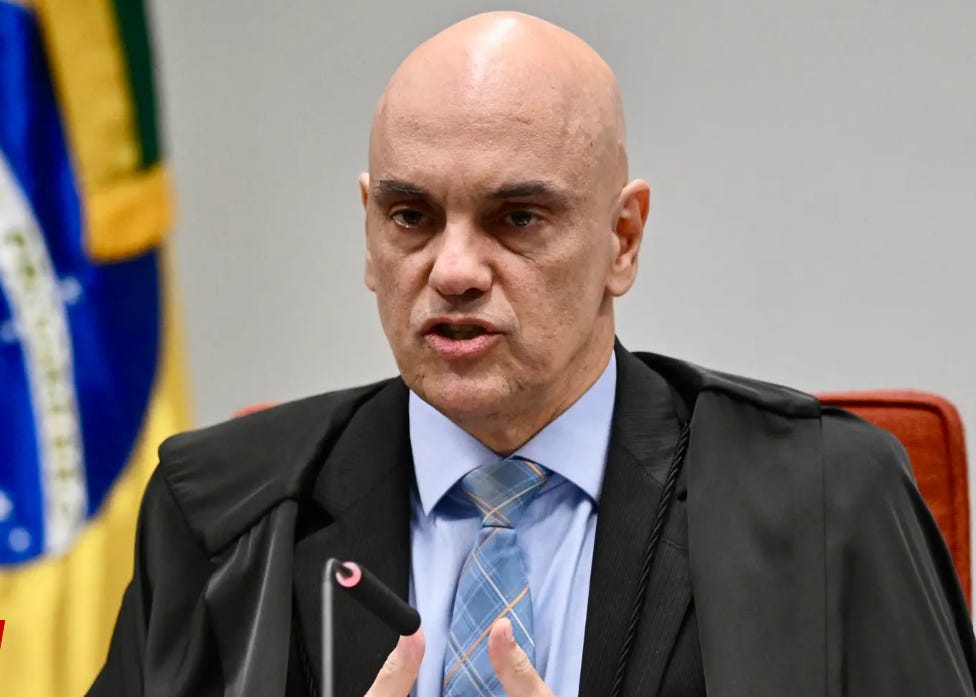GENIUS Act Signed Into Law, U.S. Imposes Visa Ban on Brazilian Supreme Court Justices Over Bolsonaro Trial, Israel Launches Attack on Syria, US to Introduce Visa Integrity Fee, and More
Grinfi Political Risk Edge Intelligence Briefing
Welcome to this week’s edition of Grinfi Political Risk Edge, your trusted source for expert political risk analysis and strategic intelligence. In this issue, we examine key geopolitical events shaping the defense, energy, and DeFi markets, providing a deep, beyond-the-headlines assessment. Anticipate, Adapt, and Excel!
But first, let’s begin the week with a laugh 😄 to brighten the mood.
Help us serve you better and improve Grinfi Political Risk Edge by taking this brief, fully anonymized reader survey.
"The only thing we have learned from experience is that we learn nothing from experience."
Chinua Achebe, Anthills of the Savannah. Heinemann, 1987, p. 123.
Disclaimer: The opinion expressed in this quote does not represent our views but is intended for reflection purposes only.
From Grinfi Political Risk Observatory (GPRO), here’s what we’re monitoring:
High Impact Situational Updates
MAJOR HEADLINES
— US Set to Introduce ‘Visa Integrity Fee’
On July 4, the U.S. government enacted the ‘One Big Beautiful Bill Act’, introducing the new $250 Visa Integrity Fee for nonimmigrant visa applicants. This mandatory fee will apply to most temporary visa categories, including tourism (B1/B2), student (F1, F2, M1), work (H-1B, H4, L-1), and exchange (J1,J2) visas.
The fee does not apply to those who are exempt, such as diplomats on A and G visas, NATO personnel, Hague-adopted children, or nationals from Visa Waiver Program countries. However, permanent residents from VWP countries are not exempted.
Under the newly passed law, the Visa Integrity Fee is intended to reduce visa overstays by acting as a refundable ‘compliance bond’. If a visa holder leaves the United States on time, within 5 days of the visa’s expiration, and does not violate visa terms such as taking unauthorized work or overstaying, the fee can be refunded in principle.
However, the refund process remains unclear, and most experts anticipate bureaucratic delays and significant hurdles in expediting payment even after implementation. As a result, the fee is currently assumed to be nonrefundable.
The $250 fee is in addition to current visa charges, including the $185 Machine Readable Visa fee, the recently increased $24 I-94 processing fee, and for students, the $350 SEVIS fee. In total, applicants may pay as much as $472 for a basic B1/B2 visa, with higher costs for students and some workers. The law gives the Secretary of Homeland Security (currently Kristi Noem), the authority to adjust the fee each year based on inflation starting in fiscal year 2026.
According to the administration, another purpose of the fee is to help fund better vetting of foreign visitors, improve visa processing and biometrics, and support the hiring of about 2,000 new consular officers. This is based on the assumption that most applicants will not request a refund. The U.S. government expects the fee could generate over $1 billion in new annual revenue.
Although the law is already active, the State Department and the Department of Homeland Security had not finalized the fee collection or refund system. Also, the exact start date for payments has not yet been announced, but it is expected by or before October 1.
The announcement and pending implementation of the fee have drawn strong criticism from the travel and tourism sectors, universities, and business groups. Some have called it a self-imposed tariff, and others, including the U.S. Travel Association, warned that the new charge could reduce lawful visits to the United States, harming both tourism and business travel. This comes at a time when the country is preparing to host the ‘2026 FIFA World Cup’ and the ‘America 250’ celebration.
The increased costs suggest a significant rise in expenses for many applicants, in some cases up to 148% more for standard visitor visas. Critics argue that the uncertainty, financial burden, and refund complications will discourage international travelers, students, and high-skilled workers, with net negative effects on the U.S. economy, job creation, and global competitiveness.
— U.S. Warns Israel Over Visa Restrictions and Extremist Attacks on Christians

On July 17, U.S. Ambassador to Israel Mike Huckabee sent a sharply worded letter to Israel’s Interior Minister Moshe Arbel warning of possible reciprocal U.S. visa restrictions in response to Israel’s delays and denials of tourist visas for evangelical Christian groups.
His letter, dated July 16 and leaked to Hebrew-language media, criticized Israel’s refusal to grant tourist visas to evangelical Christian groups and cited increasing attacks on Christians by Jewish extremists.
It accused Israeli authorities of harassment and a dismissive attitude toward Christian missions, and warned that the United States may publicly declare Israel unwelcoming to Christians and encourage American evangelicals to reconsider their donations and visits.
Below are excerpts from Huckabee’s letter as published in the Times of Israel:
Huckabee, following a visit to Taybeh on July 19, one of the scenes of destruction by anti-Christian Jewish extremists, issued an official denunciation statement and also wrote on X:
This comes just days after the IDF bombed Gaza’s Holy Family Church on July 17, killing three people, including an elderly janitor and an eighty-four (84) year old woman, and injuring others, including the priest Gabriel Romanelli. The church compound had been sheltering hundreds of displaced civilians. Israel described the strike as accidental and announced an investigation.
The warning and visa dispute coincides with a growing number of anti-Christian incidents in Israel. In 2024 alone, the Rossing Center recorded 111 cases of vandalism, spitting, and physical attacks. Church leaders, including Latin Patriarch Pierbattista Pizzaballa, attributed the rise to the growing influence of Jewish extremist groups such as the Hilltop Youth, which the U.S. Treasury designated as extremists in late 2024. Notable cases include the February 2023 vandalism of a statue at the Church of the Flagellation in Jerusalem and ongoing reports of violence in Christian communities like Taybeh.
While Minister Arbel has denied that there is any policy targeting Christian visitors, citing routine security considerations, the Israeli government has pledged to review specific grievances. Still, church leaders continue to demand stronger enforcement, pointing to delayed or insufficient police responses in cases involving attacks on Christian individuals and institutions.
The current dispute threatens to damage Israel’s relationship with U.S. evangelicals, who contribute approximately $600 million annually through donations and religious tourism. It also raises broader concerns about Israel’s standing as a liberal democratic country committed to religious freedom and minority protection, as outlined in its 1948 founding principles.
— Eswatini Accepts Deported Foreign Criminals from the US Following Secret Deal
On July 16, the government of Eswatini, led by King Mswati III, confirmed the arrival of five (5) foreign nationals deported from the United States. This followed months of clandestine high-level negotiations between the two countries under the so-called third world transfer and deportation arrangement.
The deportees, reported to be from Vietnam, Jamaica, Cuba, Yemen, and Laos, were all convicted of serious crimes in the United States and sent to Eswatini after their home countries refused to accept them.
Tricia McLaughlin, Assistant Secretary at the Department of Homeland Security announced on X:
The arrival of these individuals, reportedly via a U.S. deportation flight, has sparked criticism from Eswatini civil society groups and political activists. They accuse the authorities of “selling out” the nation and turning Eswatini into a dumping ground for foreign criminals.
Critics have raised concerns about national sovereignty, security risks, and pressure on the country’s already strained social infrastructure. With more than half of the population living below the poverty line and governance concentrated in the hands of an absolute monarchy, public discontent has deepened.
In response, the Eswatini government clarified that the deportees will be held in solitary confinement at a secure facility, while it works in coordination with the United States and potentially the International Organization for Migration to arrange their eventual repatriation. In a series of tweets, the government stated:
However, the specific terms of the agreement remain largely classified, and there is no clear timeline for their removal.
It is likely that Eswatini accepted the deportees in exchange for diplomatic or economic concessions from the United States. This possibility is reinforced by the Trump administration’s known use of deportation arrangements as instruments of third world economic and commercial diplomacy.
Eswatini’s acceptance of the deportees has fueled domestic opposition and may have caused quiet regional tension with neighboring countries such as South Africa and Mozambique.
Public frustration with the monarchy is rising, and protests are likely to follow, especially as pan-African sentiment continues to grow across the continent.
— GENIUS Act Signed Into Law
On July 18, U.S. President Donald Trump signed the Guiding and Establishing National Innovation for US Stablecoins Act (GENIUS Act) into law at the White House, establishing the first comprehensive federal regulatory framework for stablecoin cryptocurrencies.
The act, which passed the Senate in June and the House on July 17, seeks to position the United States as a global leader in digital finance while addressing financial stability and consumer protection concerns amid rapid stablecoin growth, with a $200 billion market cap reported in 2024.
The GENIUS Act requires stablecoin issuers to maintain 100% reserves in U.S. dollars or short-term Treasury securities, with monthly public disclosure of reserves. However, the law does not specifically mandate monthly audits by the Federal Reserve. Oversight is achieved through required transparency and the authority of designated regulatory agencies rather than direct audits by the central bank.
Stablecoin providers must obtain federal licenses through the Treasury Department or relevant federal regulators by January 1, 2026. Consumer protections include prohibitions on deceptive stablecoin marketing, requirements for clear fee disclosures, and a legal structure that gives holders priority claims in the event of an issuer’s insolvency.
Contrary to some early reporting, the law does not provide FDIC style deposit insurance up to $250,000 per account, but it does strengthen redemption guarantees and imposes fraud penalties of up to $1 million per day for violations.
The act allocates $10 billion over five years to fund blockchain research and provide support to U.S.-based digital asset startups. Stablecoin issuers are now classified as financial institutions under the Bank Secrecy Act, subject to full anti money laundering and know your customer compliance.
Supporters of the law argue that it will spur innovation and reduce systemic risks, citing past collapses such as TerraUSD in 2022. However, critics including Senator Elizabeth Warren of Massachusetts warned that the law may reinforce the dominance of large firms like Tether and Circle due to significant compliance costs, potentially crowding out smaller competitors and stifling broader competition. Questions also remain regarding the Treasury Department’s practical capacity to implement audits and licensing at scale by 2026, which may result in delays.
The law is expected to strengthen U.S. crypto competitiveness and holds significant potential to increase U.S. market share. However, public skepticism remains high, with political risks likely if consumer harms arise and persist.
— U.S. Imposes Visa Ban on Brazilian Supreme Court Justices Over Bolsonaro’s Trial
On July 18, U.S. Secretary of State Marco Rubio announced visa bans on multiple Brazilian Supreme Court justices, including Alexandre de Moraes, in response to what Rubio called a “political witch hunt” against former President Jair Bolsonaro.



